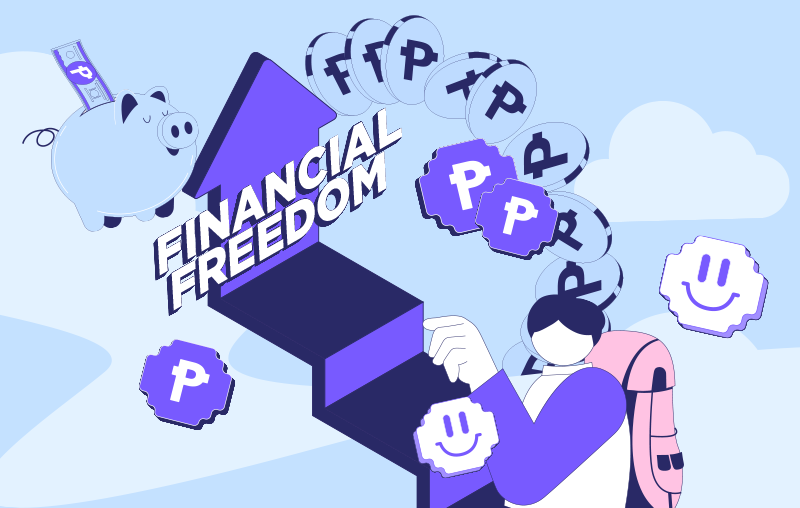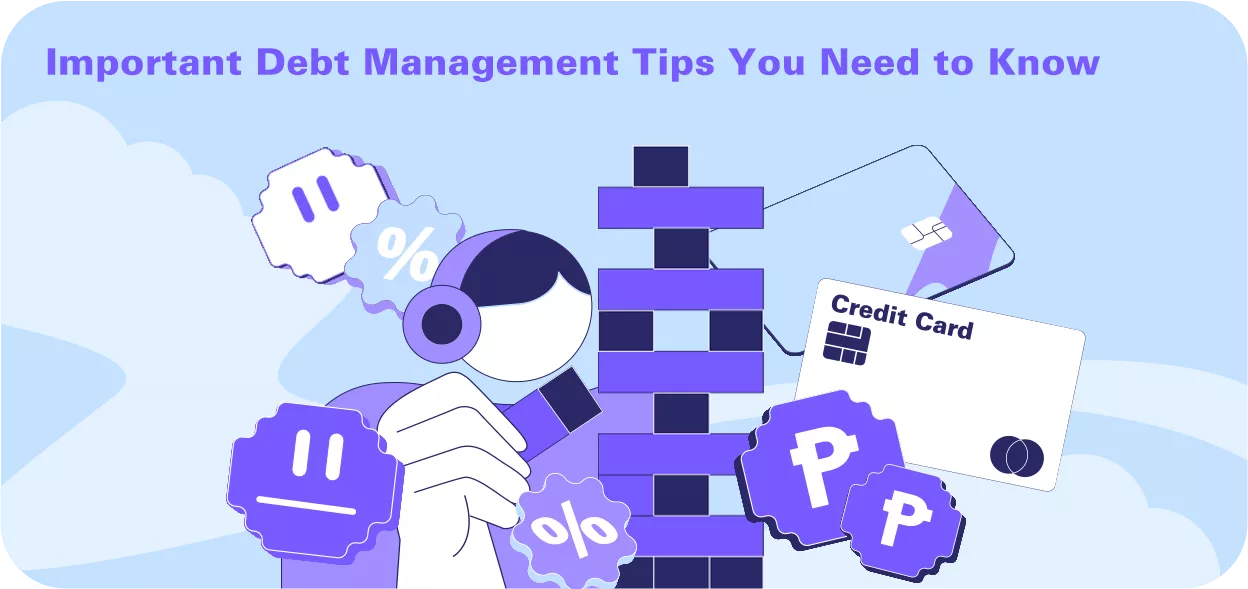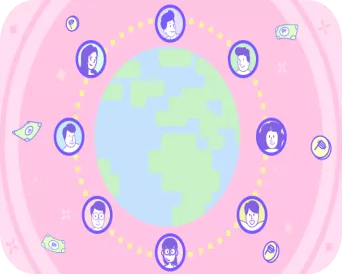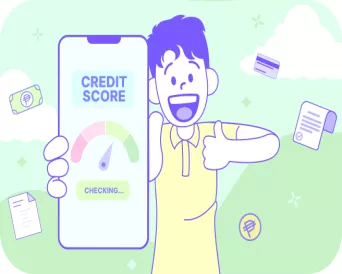It’s no secret that debt is a double-edged sword. It can be a powerful tool to achieve life's milestones like homeownership, education, or entrepreneurship. But if you don’t manage it effectively, it can bite back and turn into a crippling financial burden, leading to loan default and ultimately closing doors to financial opportunities in the future.
Don’t let the latter scare you away from taking a loan though, because that’s easy to avoid if you have the right guide - like this blog!
Here’s we’ll explore the essential strategies and tips for debt management. Ready to take this journey to financial freedom? Then keep on reading, luv!
Table of Contents
- What is Debt Management?
- Debt Situation in the Philippines
- The Importance of Debt Management
- Steps to Effective Debt Management
- Debt Consolidation
- Debt Consolidation Options in the Philippines
- Credit Counseling Services
- Avoiding Common Debt Pitfalls
- Navigating Financial Hardship
- Resources for Debt Management in the Philippines
- Conclusion

What is Debt Management?
Before we get into the meat of debt management, let’s start with the basics: What is debt management?
Debt management is the art of overseeing and controlling your outstanding debts in a strategic and responsible manner. It involves a series of financial practices and decisions aimed at reducing debt burdens, minimizing interest costs, and ultimately achieving a debt-free status.
Now that we got that out of the way, let’s roll up our sleeves and dive into the debt situation in the Philippines.
TOCDebt Situation in the Philippines
Filipinos commonly incur debt through various channels, including credit cards, personal loans, and mortgages.
Credit cards are prevalent because they offer tons of convenience. Seriously, there’s nothing more convenient than carrying around a shiny plastic card in your wallet that lets you buy almost anything! However, they often carry high-interest rates if mismanaged.
Personal loans, on the other hand, are quite flexible and can be used for anything from medical emergencies to education expenses. You can apply for them online too, giving almost anyone access to much-needed funds as long as they have a smartphone and a solid internet connection. Plus, mortgages are a common means of homeownership, typically involving long-term commitments.
Household debt levels vary, but it's essential to strike a balance between leveraging these financial tools for personal and economic growth while practicing prudent debt management.
TOCThe Importance of Debt Management
Remember when you were a kid and you didn’t want to eat veggies, but your parents forced you to because they’re important? That’s kind of the same with debt management. It’s not the tastiest, but you just have to do it.
Not convinced yet? Here are a few reasons why it’s oh-so important:
- Financial Implications of Mismanaged Debts: Mismanaged debts can lead to high-interest payments, making it harder to save and invest for the future. It's essential to avoid excessive interest costs that can drain your finances.
- Emotional and Mental Stress Associated with Debt: The weight of debt can cause stress and anxiety, affecting your overall quality of life. Effective debt management can provide peace of mind and reduce this emotional burden.
- The Impact of Debt on Long-Term Financial Goals: Unchecked debt can delay or derail your long-term financial aspirations, such as buying a home, retiring comfortably, or starting a business. Learning to manage debt can keep you on track toward achieving these goals.
Steps to Effective Debt Management

At this point, debt management must feel like this huge, tedious undertaking. Let’s fix that by breaking it down to five simple steps!
Step 1: Assess Your Debts
Start by understanding your total debt, including credit cards, loans, and mortgages. Knowing the full extent of your debt is the first step toward managing it.
Step 2: Create a Budget
Allocate funds to control your debt. You can create a monthly budget that outlines your income and expenses, then allocate a portion to cover debt payments. This ensures you have a clear plan for meeting your obligations.
Step 3: Prioritize High-Interest Debts
Identify and prioritize high-interest debts, such as credit card balances. Paying these off first can save you money in interest payments.
Step 4: Negotiate with Your Lenders
Don't hesitate to reach out to lenders if you're facing financial challenges. They may be willing to negotiate lower interest rates or more manageable payment plans to help you stay on track.
Step 5: Monitor Your Debts
Keep track of your debt and payment progress. This ensures you remain in control of your financial situation and allows you to make adjustments as needed.
TOCDebt Consolidation
A great way to keep your debts in check is debt consolidation. This is a financial strategy where you take out a single loan (preferably with low interest) in order to pay off multiple existing loans.
By doing this, you’ll end up just having to worry about one loan instead of having to manage a bunch of them at the same time!
Debt consolidation might not be for everyone though. To find out if it’s for you, here are its pros and cons:
Pros of Debt Consolidation
- Lower Interest Rates: One of the main advantages is the potential for a lower interest rate on the consolidated debt. This can significantly reduce the overall cost of your debt.
- Simplified Payments: Instead of juggling multiple due dates and payments, debt consolidation simplifies your financial life by consolidating everything into one monthly payment.
- Potential Debt Reduction: Some debt consolidation methods, like debt settlement or negotiation, may lead to a reduction in the total amount you owe, helping you become debt-free faster.
Cons of Debt Consolidation
- Longer Repayment Terms: While a single monthly payment can be convenient, it might come with a longer repayment term. This means you may pay more interest over time, even with a lower rate.
- Risk of Losing Collateral (For Secured Loans): If you use collateral, like your home or car, to secure a consolidation loan, you risk losing these assets if you can't make the payments.
- Credit Impact: Consolidating debt may initially have a negative impact on your credit score. However, as you make consistent payments, your credit can gradually improve.
Debt Consolidation Options in the Philippines
In the Philippines, you can choose from several options. Here are a few:
- Personal Loans: Many banks and financial institutions offer personal loans for debt consolidation purposes. These unsecured loans can help you pay off high-interest debts.
- Balance Transfer Credit Cards: Some credit card companies offer balance transfer programs that allow you to transfer high-interest card balances to a new card with a lower introductory interest rate.
- Debt Consolidation Companies: There are debt consolidation companies in the Philippines that can negotiate with creditors on your behalf and help you create a debt management plan.
Credit Counseling Services
Debt management can be hard on your own, so you shouldn’t hesitate to seek out credit counseling services if you feel that they would help. In this service, counselors will assess your finances, create a personalized debt management plan, and negotiate with creditors to help you regain control of your financial situation.
In the Philippines, there are two widely recognized organizations who offer credit counseling: Debt Aid Consulting International and the Credit Management Association of the Philippines, Inc. These organizations have a track record of helping individuals tackle their debt problems effectively. It's essential to research and select a counseling agency that aligns with your needs and financial goals.
Does credit counseling sound good so far? Here are a few benefits to help you decide if you want to go for it:
- Access to expert advice tailored to your unique financial situation
- Negotiation with creditors on your behalf, potentially reducing interest rates
- Improvement of your financial literacy and essential money management skills
- A supportive and structured path toward financial recovery
- Helps you regain control of your financial future
Avoiding Common Debt Pitfalls
Everyone knows that prevention is the best cure. Make debt management your middle name by avoiding these common debt pitfalls!
- Over-reliance on credit cards: Credit cards offer convenience but can lead to excessive debt if used without restraint. It's easy to lose track of spending and accumulate high-interest balances. Prudent credit card use involves setting spending limits, paying balances in full, and avoiding the temptation to overspend.
- Not having a repayment plan: Acquiring debt without a clear repayment strategy can lead to a cycle of financial stress. Before taking on any debt, develop a repayment plan that outlines how you'll meet your obligations. Ensure it fits within your budget to prevent future financial strain.
- Getting high-interest, short-term loans: High-interest, short-term loans, often known as payday loans or quick cash loans, can be appealing in emergencies but come with sky-high interest rates. These loans can lead to a debt spiral, making it challenging to break free. Explore alternative options, like personal loans or borrowing from friends or family, before resorting to these costly loans.
- Falling into the pit of Insolvency: Insolvency isn't just a fancy word for being broke, luv. It’s a legal status where your liabilities exceed your assets, making it impossible to meet debt obligations on time. It’s what happens when life’s unpredictabilities outpace your financial buffer. But insolvency is not inevitable. It’s a warning sign to take your debt management seriously and to seek help if you’re struggling. Whether it’s consulting with credit counseling services, exploring debt consolidation, or simply getting back to budgeting basics, there are paths back to solid ground.
Navigating Financial Hardship
When life throws unexpected financial challenges your way, it's essential to have a plan in place. Here are some steps to take when facing such difficulties:
- Open Communication with Lenders: If you're struggling to meet your debt obligations due to unexpected financial hardship, don't avoid your lenders. Reach out to them as soon as possible. Many lenders are willing to work with borrowers facing temporary setbacks. You can discuss options like deferment, forbearance, or restructuring your repayment plan to make it more manageable.
- Understand Your Rights and Protections as a Borrower: It's crucial to be aware of your rights and protections as a borrower in the Philippines. Familiarize yourself with the relevant laws and regulations that govern lending and debt collection practices. Understanding your rights can help you navigate challenging situations with confidence and ensure that your interests are protected during financial hardships.
- Seek Professional Financial Guidance: During times of financial distress, it can be immensely helpful to consult with a financial advisor or counselor. These experts can provide you with personalized guidance and strategies for managing your specific situation. If you’d rather read blogs or watch videos on your down time, you can check out content by the likes of Fitz Villafuerte, Nicole Alba (the perfect person for those in their early 20s!), Antonette Aquino, and Chinkee Tan.
Resources for Debt Management in the Philippines
In your journey toward effective debt management, accessing the right resources can make a significant difference.
For starters, you can try out some budgeting and debt-tracking apps. The Tonik App has a neat feature called “Stashes,” which you can use to allocate funds for every expense you make. On top of that, you can earn up to 4.5% p.a.! Other budgeting tools include Moneygment, Money Lover, and Splitwise.
In times of financial crisis, it's important to know where to turn for help. Local organizations like the Pag-IBIG Fund and Social Security System (SSS) in the Philippines offer financial assistance programs and resources. Additionally, helplines such as Toll-Free National Consumer Affairs Center (NCAC) can provide guidance on consumer issues and financial matters.
TOCApply for Tonik Digital Bank Loans Today
Looking for loans that make debt management easy? Then consider applying for Tonik Digital Bank Loans today!
Our unsecured options give you tons of flexibility by letting you choose your terms. Not only that, but we also offer monthly add-on interest rates that can go as low as 1.7% for a maximum of PHP 250,000 for up to 18 months!
If a secured loan is what you’re after, you can get a Tonik Big Loan, which lets you borrow up to PHP 5,000,000. You just need minimal requirements including a fully-paid residential property in Metro Manila or condo in Cavite, Laguna, Bulacan, or Rizal as collateral.
Ready for the loans of your dreams? Download the Tonik App and apply today!







